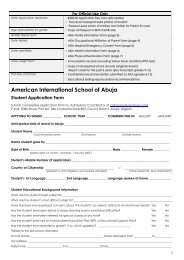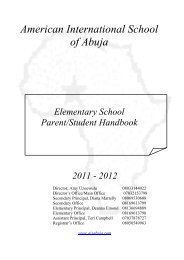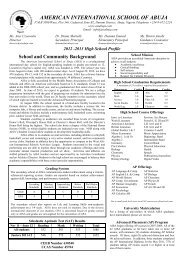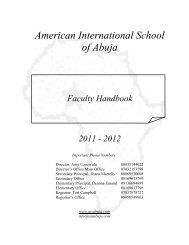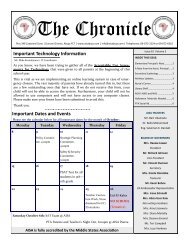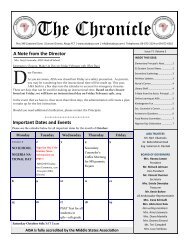Secondary School Timetable 2011-2012 - American International ...
Secondary School Timetable 2011-2012 - American International ...
Secondary School Timetable 2011-2012 - American International ...
You also want an ePaper? Increase the reach of your titles
YUMPU automatically turns print PDFs into web optimized ePapers that Google loves.
All students on academic probation will have their progress reviewed periodically and at the end of<br />
the semester by the Principal and Counselor, in consultation with the teacher(s). A student who<br />
remains on academic probation for more than one additional semester will be reviewed by the<br />
Principal, Counselor, and teacher(s) to determine the specific educational problems. If it is<br />
concluded that AISA does not offer a program that meets the needs of the student, or if a student is<br />
not making sufficient progress, the student may be assigned to repeat the current grade level, or may<br />
be asked to withdraw from AISA, at the discretion of the Administration.<br />
A student who is on academic probation is ineligible for extra-curricular activities until satisfactory<br />
improvement is made, as determined by the Principal. Students on academic probation are not<br />
automatically removed from academic probation with an improvement of grades. Typically,<br />
academic probation is continued until the student shows consistency and an upward trend in<br />
performance.<br />
Academic Integrity<br />
Part of the role of the school is help mold our young people into responsible citizens of the world—<br />
citizens who possess self-discipline and value individual accountability. Academic honesty refers to<br />
cheating, plagiarism, theft, and inappropriate use of the Internet and other school resources. This<br />
section will help explain what is expected of our students, as well as the consequences for<br />
inappropriate choices.<br />
Cheating<br />
Cheating is the practice of deceit to enhance one’s grade. It includes, but is not limited, to:<br />
Giving or receiving aid on or for examinations, tests, quizzes, projects, homework, etc.<br />
Using outside materials, including student notes, on an examination, test, quiz, project, etc.,<br />
except when authorized by a teacher<br />
Unauthorized prior possession of assessment materials, workbook answers, etc.<br />
Plagiarizing by using words, writings or works of another without crediting the source, or<br />
fabricating information or citations instead of giving the actual citation (see below for more<br />
on plagiarism)<br />
Resubmitting the same work (e.g. research paper) for which credit has already been given in<br />
that class or any other class, or in any other year<br />
Copying from or tampering with the academic work of others, including homework and<br />
projects<br />
Facilitating other students’ acts of academic dishonesty. This includes providing other<br />
students with homework answers, test/quiz answers, original or photocopied essays, or<br />
related activity<br />
Plagiarism<br />
Derived from the Latin word for “kidnapper”, plagiarism is defined by Webster as “presenting the<br />
ideas or words of another as one’s own.” Plagiarism may take the form of:<br />
Cutting and pasting articles or parts of articles from the Internet or research CD into your<br />
own work<br />
Repeating another’s phrases, sentences or paragraphs as your own<br />
Copying another student’s work<br />
Paraphrasing someone else’s writing as your own<br />
In short, to plagiarize is to give the impression that you have written or thought something that you<br />
have, in fact, copied from another source. If you use another person’s words, they must be<br />
acknowledged (cited) as such.<br />
23



